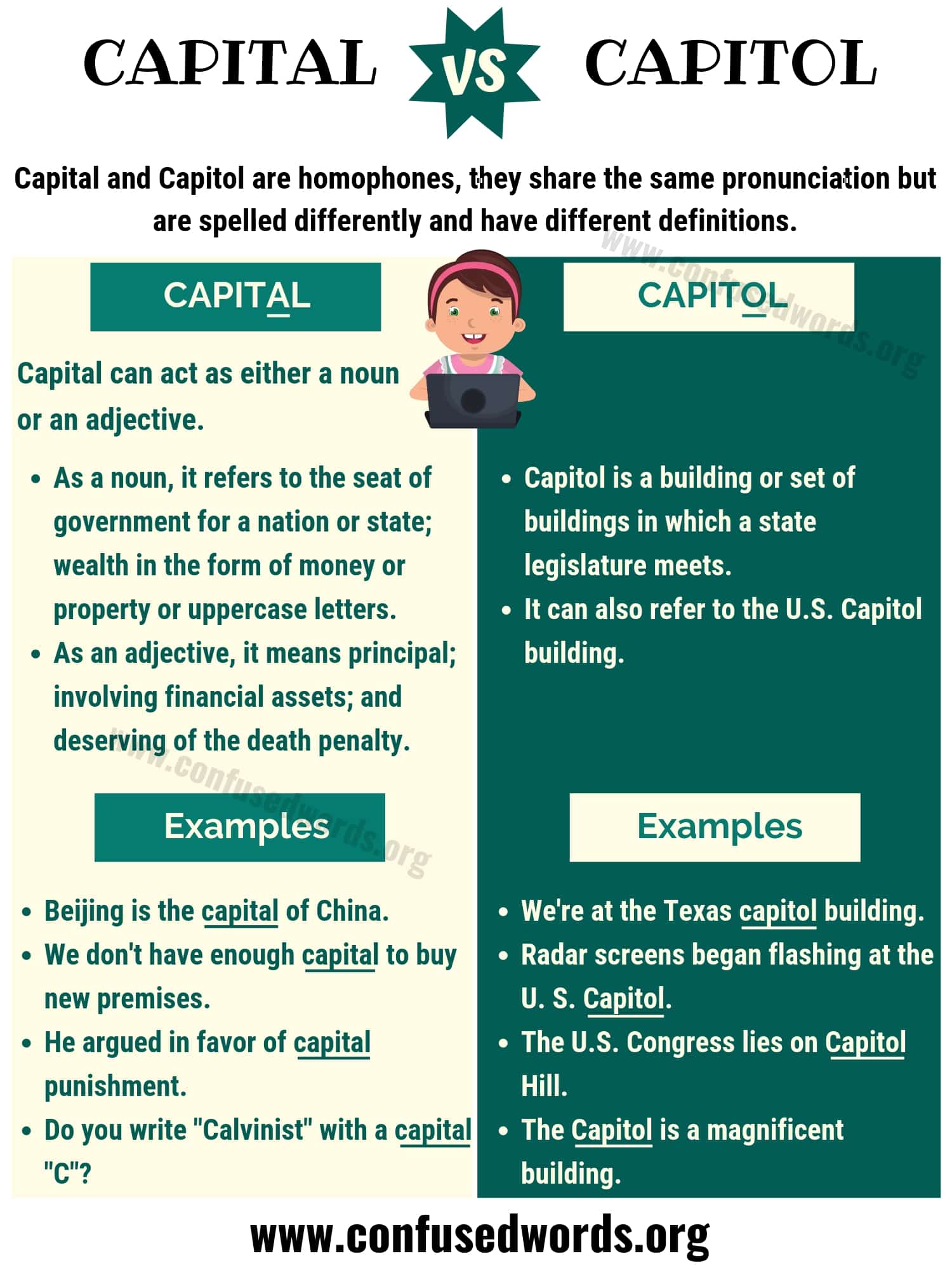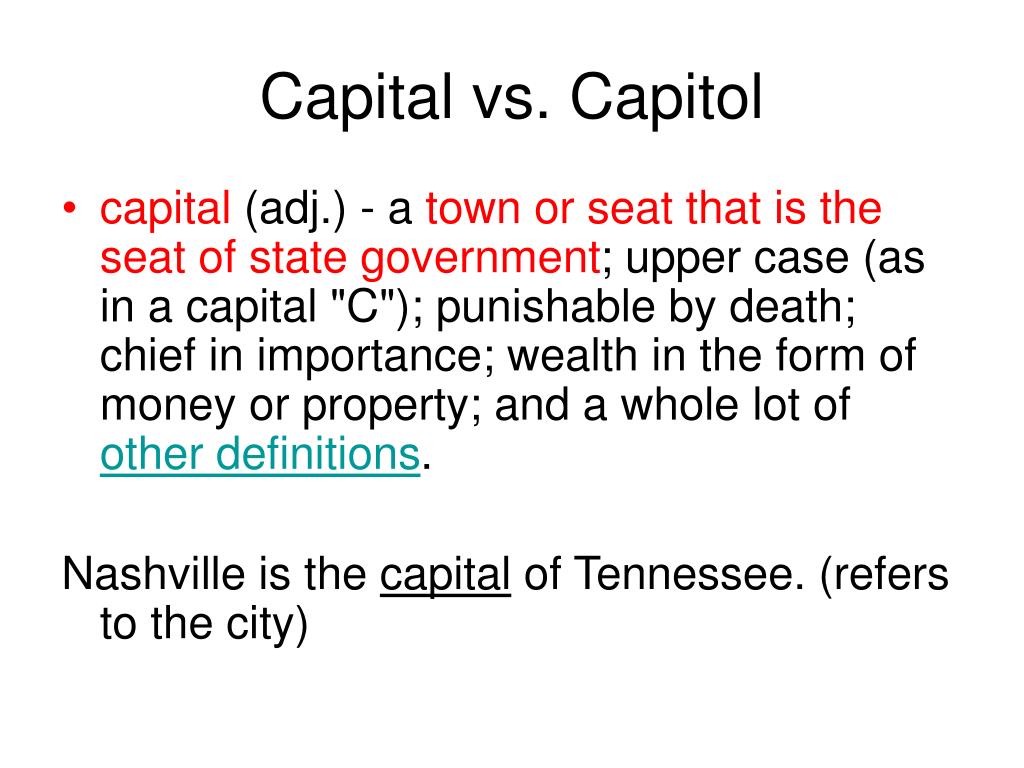Have you ever found yourself scratching your head over the difference between capital and capitol? It’s a common mix-up, and it’s easy to see why. These two words sound almost the same, but their meanings can be worlds apart. Whether you’re writing an article, preparing a presentation, or just chatting with friends, getting these terms right can make all the difference. Let’s tackle this tricky pair and clear up any confusion once and for all.
For starters, capital is a word that wears many hats. It could refer to a city, money, or even the top part of a letter. On the other hand, capitol is a bit more straightforward—it’s all about buildings where lawmakers gather. The distinction might seem small, but it’s an important one. Mixing them up could lead to some awkward moments, especially if you’re trying to impress someone with your knowledge of government structures.
Now that we’ve set the stage, it’s time to dig into the specifics. Don’t worry; we’ll keep things simple and straightforward. By the end of this article, you’ll have a solid grasp of when to use capital and when capitol is the right choice. So let’s get started, shall we?
What Exactly is the Difference in Capital vs Capitol?
Alright, so what’s the deal with these two terms? To put it simply, capital is the broader term. It can mean a city where the government resides, a store of wealth, or even an uppercase letter. Capitol, though, narrows down to one specific thing: a building where the government conducts its business. It’s like comparing a whole city to just one building within it. That’s the basic distinction, but there’s more to explore.
How Do You Know When to Use Capital?
Let’s break it down a little more. When you’re talking about a city that serves as the center of government, you’re dealing with capital. For example, the capital of New York is Albany. See how that works? Capital also comes into play when you’re referring to money or resources. Think about startup capital or financial capital. It’s not just about cities; it’s about anything that holds significant value or importance.
Is Capitol Only for Government Buildings?
Now, here’s where capitol steps in. Capitol is all about the structure where lawmakers meet. For instance, the U.S. Capitol Building is the place where Congress holds its sessions. The word capitol is specifically tied to government buildings, particularly those at the state or national level. So if you’re writing about a legislative building, capitol is your go-to term.
- Chicago Bulls Logo Upside Down
- Places To Eat In Wilmington Nc
- Omar J Dorsey
- Ugly Hairstyles
- Audacity Definition
Why Does the Confusion Between Capital and Capitol Happen?
Let’s be honest, it’s easy to mix up these two terms. They sound so alike that even seasoned writers can stumble. But there’s a little trick that might help you out. Think about the letter “o” in capitol. That “o” can remind you of the round dome on many capitol buildings. Pretty neat, right? It’s a simple way to keep the two straight.
Do You Really Need to Worry About This?
You might be wondering if it’s worth the effort to memorize the difference. The truth is, yes, it matters. Using the wrong word can change the meaning of your sentence entirely. Imagine saying, “The capitol of California is Sacramento.” That would be a bit off, wouldn’t it? Being precise with your language ensures your message is clear and accurate.
Can You Use Capital for Both Situations?
Sometimes, people just default to capital because it’s the more common term. While this might work in casual conversation, it’s not always correct. If you’re specifically referring to a government building, capitol is the only option. Remember, capital covers a wide range of meanings, but capitol is reserved for those specific structures.
Examples to Illustrate Capital vs Capitol
Let’s look at some examples to make this clearer. Here’s a sentence using capital: “Paris is the capital of France and a hub for fashion and culture.” See how capital refers to the city? Now, here’s one with capitol: “The state capitol in Texas is a stunning example of neoclassical architecture.” In this case, capitol points directly to the building where the legislature meets.
Here’s another pair. “Detroit is the automotive capital of the world.” In this sentence, capital refers to the city’s significance in the car industry. On the flip side, “The capitol building in Washington, D.C., is a symbol of democracy.” Here, capitol highlights the building itself.
What About Capital in Other Contexts?
Capital doesn’t stop at cities and money. It also describes uppercase letters, like when you’re told to write in capital letters. Or it might refer to something serious, like capital punishment. These various uses show just how versatile capital can be. But no matter how you slice it, capitol stays focused on those government buildings.
Table of Contents
- What Exactly is the Difference in Capital vs Capitol?
- How Do You Know When to Use Capital?
- Is Capitol Only for Government Buildings?
- Why Does the Confusion Between Capital and Capitol Happen?
- Do You Really Need to Worry About This?
- Can You Use Capital for Both Situations?
- Examples to Illustrate Capital vs Capitol
- What About Capital in Other Contexts?
Summary
In the end, mastering the difference between capital and capitol boils down to understanding their unique roles. Capital is the versatile term that covers cities, money, and more. Capitol, on the other hand, is all about the buildings where laws are made. With a little practice and some handy tricks, you’ll be using these terms like a pro in no time. So next time you’re writing about government or cities, you’ll know exactly which word fits best.



Detail Author:
- Name : Prof. Gerhard Weissnat
- Username : jkirlin
- Email : cassidy.ryan@yahoo.com
- Birthdate : 1977-01-26
- Address : 534 Wallace Highway Suite 757 Gulgowskiside, IN 08767-3336
- Phone : +1.213.786.1659
- Company : Langosh Inc
- Job : User Experience Manager
- Bio : Similique praesentium nihil nihil facere cumque a. Itaque eos sit non. Fugiat minima culpa iusto sequi.
Socials
tiktok:
- url : https://tiktok.com/@sjacobson
- username : sjacobson
- bio : Fuga voluptatem optio dignissimos nulla enim sequi voluptatum.
- followers : 5133
- following : 965
twitter:
- url : https://twitter.com/sydney6752
- username : sydney6752
- bio : Quisquam eum repellat expedita qui. Iste repellendus distinctio fugit eligendi.
- followers : 6696
- following : 2126
facebook:
- url : https://facebook.com/sydney_jacobson
- username : sydney_jacobson
- bio : Voluptatibus dolorem velit quo ipsum dolorem.
- followers : 5725
- following : 438